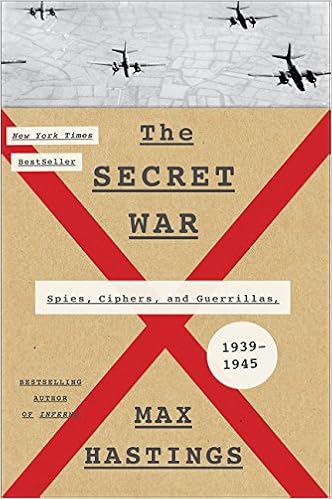I chose to title my review with this quote from Winston Churchill because it so eminently sums up the great difficulties faced by intelligence gathering, especially during a war fought using mid-twentieth century level technology. World War II was a conflict fought not just on battlefields on land, sea, and the air but also by men and women seemingly far from the action who labored to gather and then interpret enemy communications. Max Hastings has produced yet another densely fact-filled but gripping history of the Second World War as it was fought behind the scenes by imperfect people using imperfect and sometimes brand-new devices.
The Secret War covers the war years roughly chronologically, though of necessity it frequently shifts backwards and forwards in time as Hastings describes the activities of different nations and spy bureaus. Before 1939 the country with the most sophisticated spy apparatus was the Soviet Union, though its efficiency had been undermined both by the Purges of the late 1930s as well as Joseph Stalin's paranoia. Similarly, Nazi Germany's espionage efforts were hampered by Adolf Hitler's insistence on micro-managing the war effort. As is to be expected, the British efforts are Hastings' major focus, though he also pays close attention to those of the United States and Japan. Some of Hastings' material will be familiar to people who enjoyed "The Imitation Game," for example, though naturally The Secret War provides much more depth and analysis than any movie ever could. Names now well known like Alan Turing and the other Bletchley Park boffins, Richard Sorge (who was a Soviet agent who tricked the Nazis into thinking he was working for them out of their Tokyo embassy),and the infamous Cambridge Five all receive ample coverage in great detail. Even more fascinating are the stories Hastings tells of the lesser-known and seemingly minor heroes and heroines who played small but vital roles: an Irish governess named Mrs. Daly, Mrs Violet Ferguson and her prized tea set, and the egotistical volunteer aptly codenamed "Blunderhead."
I believe I enjoyed the chapters "Islands in the Storm" and "A Little Help From Their Friends" best because they hold so many stories of eccentric, usually vainglorious, but certainly heroic figures, often inimitably summed up with such pithy phrases as "a haversack of blimpic prejudice." I found the references to Soviet espionage efforts in the United States before and during the war disturbing though hardly surprising, and I appreciated Hastings' care to describe Joseph McCarthy's witch-hunt as "unfounded against many individuals, but had substance in the generality." Above all, I found Hastings' repeated conclusions that much of the espionage had limited effects on the war's overall progress, and that projects like Ultra which were vital were often not made use of to their maximum potential, revelatory if disappointing.
This fascinating book of 555 pages plus extensive notes is impeccably documented, amply illustrated, and extremely well written. It certainly deserves a place in the library of any student of World War II or of twentieth century espionage. And certainly, if you are ever tempted to believe that Ian Fleming's James Bond or other fictional spy heroes are too fantastic to be believable, some time spent perusing the pages of The Secret War will quickly change your mind.

No comments:
Post a Comment